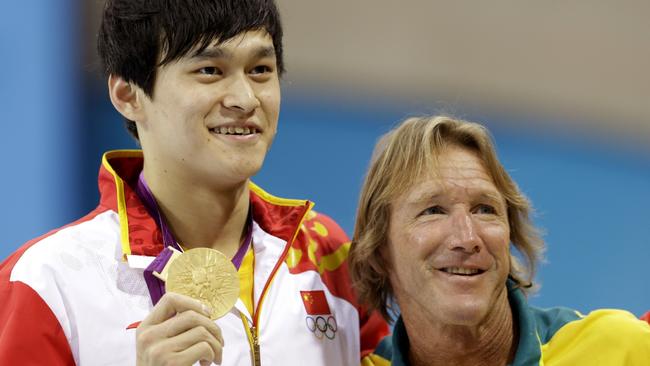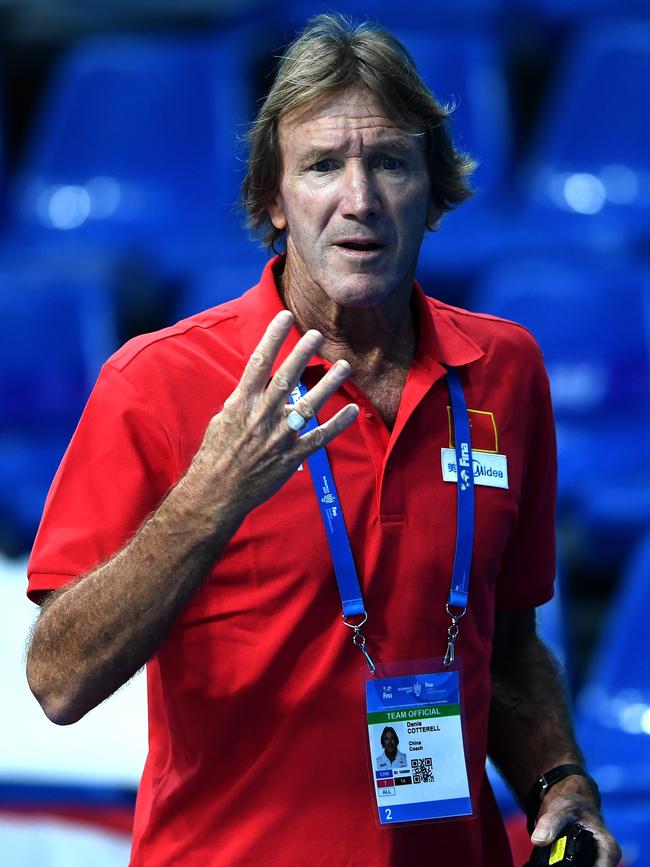Chinese swim star Sun Yang’s Aussie coach Denis Cotterell lashes ‘hypocrites’
Sun Yang’s coach, Denis Cotterell, says the star is as clean as his other great protege, Grant Hackett.

Sun Yang’s coach, Denis Cotterell, an Australian national team mentor for 30 years, says the Chinese star is as clean as his other great protege, Grant Hackett, and it is hypocritical for Australian swimmers to vilify the world champion when some of their teammates have broken anti-doping rules.
In his first interview since Sun was publicly snubbed by Australian rival Mack Horton on Sunday, Cotterell revealed his sadness and anger at what he says are ill-informed accusations that continue to be levelled at China’s Olympic gold medallist. He says it is insulting to suggest that he would work with a drug cheat. “I am happy to be working with him,’’ Cotterell told The Australian from the FINA World Championships in Korea.
“I love working with an athlete who has paid their dues, has longevity and is still achieving. If you think for a second I would be doing that with someone that is a cheat then people don’t know me. That is an insult.
“What is the definition of a drug cheat? Someone who has failed a test? By that definition, they have got drug cheats on the Australian team. I have been on teams where people have failed a drug test, accidentally and through no fault of their own. I would never call them cheats. It seems to be very hypocritical.”
MORE: FINA changes rules on protests
The shunning of the Chinese star by rival swimmers produced ugly scenes in Gwangju on Tuesday night, with British competitor Duncan Scott refusing to shake hands with Sun during the medal ceremony after finishing third to him in the 200m freestyle and Sun gesticulating angrily towards Scott.
This followed Horton’s protest against Sun on the opening night of competition, when he finished second to Sun in the 400m and refused to step foot on the podium or be photographed with his bitter rival. Horton will on Friday swim the 200m relay alongside Thomas Fraser-Holmes, a former protege of Cotterell who was banned by FINA for 12 months for missing three drug tests in the space of a year.

An Australian team member not in Korea, Madeline Groves, narrowly escaped a similar ban. Groves missed two tests but was found not to have missed a third after a FINA anti-doping panel found that the testers did not “do everything in their power” to find her at her college dorm. Groves has been outspoken in her condemnation of Sun.
Missing a drug test is a relatively minor doping infraction compared with the latest allegations against Sun; that he refused to submit to a drug test and tampered with the testing by using a hammer to smash open a secure container which held a blood sample he had just given. The FINA anti-doping tribunal that heard Sun’s case described has actions as “foolish in the extreme’’.
The same panel cleared Sun of both doping charges. That decision, handed down in January, is being appealed to the Court of Arbitration of Sport by the World Anti-Doping Agency. It follows a three-month ban served by Sun in 2014 for taking a banned heart medication.
Horton’s stance was welcomed by current and past Australian swimmers led by Dawn Fraser, Susan O’Neill and Libby Trickett, who argue Sun should not be competing while the appeal against him is pending. “Why is he even at these world championships?” O’Neill said. American breaststroke champion Lilly King described the decision to allow Sun to swim in Gwangju as insane.
Tony Nolan QC, an experienced sports lawyer who has advocated for and against athletes and presided in tribunals in dozens of anti-doping cases, told The Australian he saw no reason why Sun should be barred from competing.
“There has been an independent hearing of a tribunal; he has won. There is an appeal pending; he has every chance to be successful,’’ Nolan said after reading FINA’s 59-page judgment. “Why should his career be ruined on a provisional suspension when it hadn’t been previously sought?”
Cotterell says Sun’s critics ignore three crucial facts; that no anti-doping tribunal has ever found Sun guilty of deliberately taking a banned substance, that the FINA tribunal found he had no case to answer on the matters now before CAS and that the delay in hearing his appeal was not caused by Sun.
Cotterell has a significant personal and professional stake in the outcome of the CAS hearing. He is well paid to be Sun’s coach. If CAS upholds the doping case against his charge, an outstanding coaching career that saw Cotterell inducted into the Sport Australia Hall of Fame will come to an ignominious end.
He also knows Sun better than anyone who is publicly calling for the Chinese champion to be banned from the sport.
He first started working with Sun after the Beijing Olympics, when the then 15-year-old prodigy scraped into the 1500m final. He took him to the London Olympics, where he won the 400m and set a new world record in the 1500m. He has worked with him, off and on, over an 11-year international career that has produced more Olympic and world championship titles than any male swimmer other than Michael Phelps.
In the lead-up to these championships, Cotterell spent an intensive three months with Sun in Guangzhou, Beijing and Hong Kong. Cotterell says Sun is a singularly focused swimmer who still lives with his parents and, aside from an ice-cream treat once a week, is meticulous about every aspect of his diet, training and preparation.
He is also a sensitive man who is acutely aware of his standing in Chinese sport and the importance of his legacy to future Chinese athletes, Cotterell says.
“I see Karl Stefanovic of all people has called him arrogant and up himself. And he would know how? Justified by what? It is pretty rich coming from him.
“I’m at a loss. He’s been cleared. He knows he is not a drug cheat. To keep getting accused; frustration might be an understatement.”
Sun’s frustration was broadcast around the world after the 200m freestyle final and triggered formal warnings from FINA to both Sun and Duncan Scott. According to Cotterell, the confrontation began backstage before the medal ceremony, when Scott refused to shake Sun’s hand and urged the other placegetters to do the same.
“It is starting to get to Sun Yang. He is an emotional guy. How many times can you get insulted? It would be better if he could ignore the whole kerfuffle, but it builds and he is human.’’
The coach is in firm agreement with Australian swimming legends and today’s competitors who believe that FINA has not done enough to eradicate doping in swimming. He is adamant, however, that Sun should not be the villain in the piece. “Of course we want a clean sport. That is an absolute given. I wouldn’t be here for a second if I thought he wasn’t. We want a clean sport and we want transparency. Unfortunately, he has been dragged into this beef that the swimming world has with FINA.’’
It will be difficult for Cotterell to alter poolside perceptions after the bizarre altercation between Sun and drug testers at his Hangzhou villa in the early hours of September 5 last year.
What began with a three-person team from International Doping Tests Management knocking on Sun’s door to conduct a random, out-of-competition test culminated in Sun standing in the dark of night, using his phone as a flashlight, while a security guard employed at his residential compound hammered away at a locked box containing vials of his blood. Yet, for all its salacious detail, the case against Sun turns on a simple proposition; whether the testers who visited Sun clearly identified themselves as working with IDTM and followed the strict anti-doping protocols required by the World Anti-Doping Code and FINA.
The FINA tribunal found they didn’t. It cleared Sun on the grounds that Sun was not properly notified and his blood not collected with proper authorisation. It also upheld Sun’s accusation that one of the testers surreptitiously took pictures and video footage of him, conduct it described as “highly improper and extremely unprofessional’’.
Cotterell says that to understand why Sun reacted as he did, you need to have swum a mile in his togs. “After hundreds and hundreds of tests you know the protocol.
“They didn’t follow it and all those facts are there. If things aren’t right are you just going to give up your blood to strangers who don’t have credentials?”
He also make a salient point about the sequence of events that night. When the testers first arrived at Sun’s villa, he wasn’t home. A short time later, Sun received a call from his mother to tell him that testers were waiting for him.
If he was a cheat trying to evade detection, he could have simply stayed away and received a strike for missing a test.
“If Sun Yang really had something to hide, why did he go home?” he asks.
The details of Sun’s three-month doping ban have been similarly lost amid the debate about drugs, cheats and FINA’s inability to adequately protect its sport from either.
At the 2014 Chinese national swimming championships, Sun tested positive to Trimetazidine, a stimulant added to the banned list four months earlier.
Sun’s case was heard by the Chinese Swimming Federation. They found him guilty of taking a banned substance but accepted his explanation; that Trimetazidine was an ingredient in a medication that Sun had been diagnosed by his doctor for a genuine heart condition. WADA reviewed and accepted the finding that Sun’s doping was not deliberate.



To join the conversation, please log in. Don't have an account? Register
Join the conversation, you are commenting as Logout